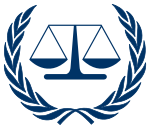Legal tools
The Legal Tools are a specialized legal database operated by the International Criminal Court . As a legal information system on international criminal law , the database serves, among other things, to better compare the prosecution of international law crimes ( genocide , crimes against humanity , war crimes and the crime of aggression ) internationally. It is intended to provide legal practice, academic research, non-governmental organizations and the interested public with free access to legal documents relating to international criminal law. The legal tools currently contain over 103,000 documents (as of April 2016). This includes u. a. Decisions of national and international courts, international treaties and legal specialist articles.
The creation of the legal tools is carried out by a large number of international cooperation partners, in particular academic research institutions and non-governmental organizations . The cooperation partner in Germany is the International Research and Documentation Center for War Crimes Trials at the University of Marburg. The database was technically implemented and operated by the non-profit Saarland company Europäische EDV-Akademie des Rechts until mid-2017 .
The International Criminal Court links to the database in its published decisions. So contains z. B. alone the judgment of the Chamber of Procedure in the trial against Germain Katanga 538 Hyperlinks .
Web links
- Website of the Legal Tools project
- Building a public commons of legal sources in international criminal law (brochure on the Legal Tools database, English; PDF file, approx. 974 kB)
Individual evidence
- ^ Status of work on the tools, legal-tools.org
- ↑ Table of responsibilities, legal-tools.org
- ^ ICC, judgment of March 7, 2014 (Katanga, TC) , English; PDF file, approx. 6.7 MB.
